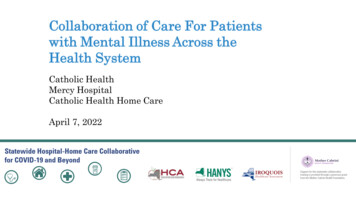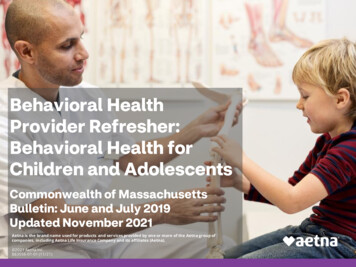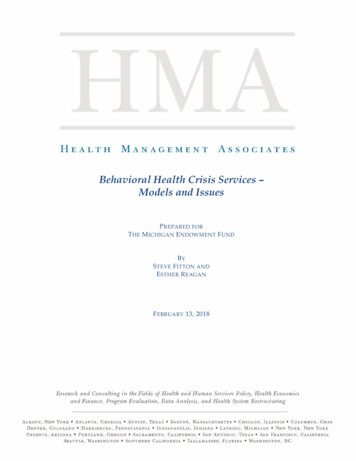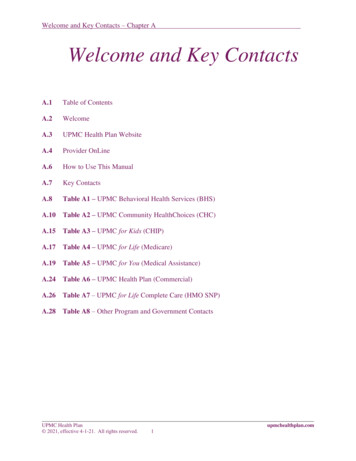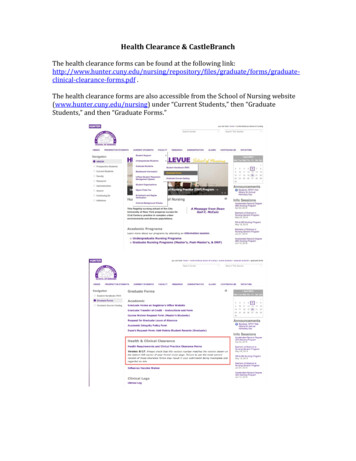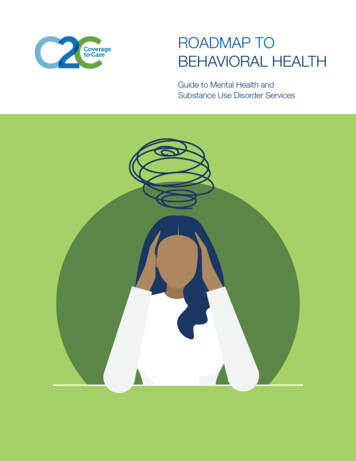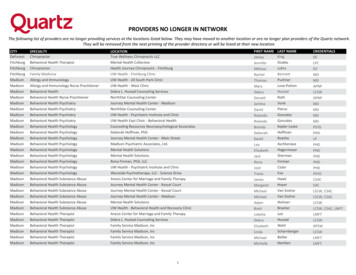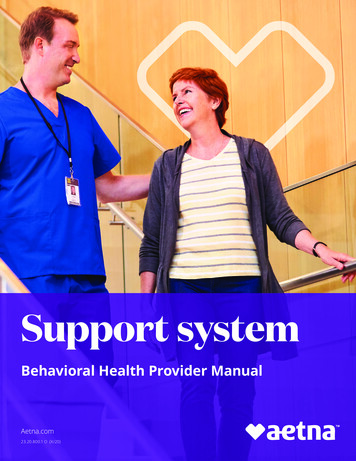
Transcription
Support systemBehavioral Health Provider ManualAetna.com23.20.800.1 O (X/20)
Table of contentsIntroduction .3Our programs.4Clinical delivery .7Quality programs .14Working electronically with us . 22Appendix A: Aetna Behavioral Health treatment record review criteria and best practices .24This Behavioral Health Provider Manual, the EAP Manual and other related communications are posted on Aetna.com,on the Provider Education & Manuals page.Aetna is the brand name used for products and services provided by one or more of the Aetna group ofcompanies (Aetna). Aetna Behavioral Health refers to an internal business unit of Aetna.2
IntroductionWelcome to the Aetna Behavioral Health networkOur behavioral health programs focus on the important role of mental health on a person’s overallwell-being. We’ll give you valuable tools to help you work with us and provide quality service to ourmembers. This manual is an extension of your contract with us. All practitioners and facilities must abideby the conditions set forth in your contract and in our provider manuals.Our guiding principlesHow to reach usOur behavioral health programs support our belief in thefollowing:Our medical directors and staff are available to speakwith you about utilization management issues. They’reavailable, during and after business hours, via toll-freetelephone numbers. Behavioral health medical directorsmake all final coverage* denial determinations involvingclinical issues. Enhancing our members’ — your patients’ —clinical experiences Adhering to the importance of the mind-bodyprinciple and connection Providing a treatment approach that is evidence-based,goal-directed, and consistent with accepted standardsof care, all Aetna Clinical Policy Bulletins, and Aetnaclinical practice guidelines Providing treatment that is medically necessary Educating members about the risks and benefits ofavailable treatment options Developing a strong relationship with you,informing you about resources, and concentratingon continuity of care among all, for the benefit ofyou and your patients Integrating behavioral health care across ourproduct spectrumWhat you’ll find in this manualWe developed this manual with you in mind — giving youwhat you need to work with us and make administrationeasier. This manual contains information about: Network participationCondition management ite visits and monitoringContact information/how to reach usClinical practice guidelinesAuthorization and referral processesMember and provider denials and appealsCase managementQuality programsWorking with us electronically, and much moreIf a treating provider doesn’t agree with a decision aboutcoverage or wants to discuss an individual member’scase, Aetna Behavioral Health staff are available 24 hoursa day, 7 days a week. Behavioral health care providerscan contact staff during normal business hours(8 AM to 5 PM, Monday through Friday)** by calling thetoll-free precertification number on the member’s IDcard. When only a Member Services number is shown onthe card, you’ll be directed to the Precertification unitthrough either a phone prompt or a Member Servicesrepresentative.On weekends, company holidays, and after normalbusiness hours, members and providers can use thesesame toll-free phone numbers to contact our staff.Our staff identify themselves by name, title andorganization when they initiate or return calls aboututilization management issues. We also offer TDD/TTYservices for deaf, hard-of-hearing, or speech-impairedmembers, and language assistance for members todiscuss these issues.3
Our programsMembers who complete this program show significantsymptom relief and improvement in overall health.Behavioral Health ConditionManagement programTo learn more about the Aetna Behavioral HealthMember Support program, call us at 1-800-424-4660(TTY: 711).We offer a case management program that supportspatients’ medical and psychological needs. Our focus ison helping our members make the best use of theirbenefits by coordinating behavioral health and wellnessservices. To support the efforts of clinicians, we alsoclosely follow patient progress and treatmentrecommendation adherence and share it with you.Through this program, we: Work with your practice and other health careprofessionals on patient progress Evaluate patient needs to promote full use ofcovered services and benefits in support of yourtreatment plan Provide educational materials and decision-supporttools, both online and via mail, so patients betterunderstand their illness Use case management by phone to support patientadherence to your treatment planThis program provides additional care options for youreligible Aetna patients.Who may benefit from our Behavioral HealthMember-Support program Aetna members (children, adolescents and adults):- With co-occurring medical and behavioralhealth conditions- With complex behavioral health conditions whohave had inpatient readmissions, extendedhospitalization stays, or suicide attempts resultingin medical admissions Aetna members ages 14 and older:- Who have symptoms of major depression,dysthymia, depression not otherwise specified, orbipolar depression- Who are diagnosed with anxiety disorders, such asgeneralized anxiety, panic disorder, or post-traumaticstress syndrome Aetna members ages 18 and older who have an alcoholproblem, including alcohol dependence or a moresevere alcohol use disorderWe’ve developed a spectrum of behavioral healthservices for our members. In doing so, we contract withlicensed psychiatrists, psychologists, social workers andother master’s-prepared clinicians. Among thesepractitioners, numerous clinical, linguistic, and culturalspecialties are represented to serve individual memberand geographic needs. Our goal is to create acollaborative relationship with the behavioral healthcare professional community. We believe that the keyto quality care and member satisfaction is a diverse,well-informed, quality network. To accomplish this, wecredential clinicians who are independently licensed andwell trained in their particular area of expertise.Credentialing/recredentialingA behavioral health care professional must becredentialed by us before joining the behavioralhealth network.We use a standard application and a common databasethrough the Council for Affordable Quality Healthcare(CAQH ) to gather credentialing information.Our recredentialing processWe reassess a provider’s qualifications, practice andperformance history every three years, depending onstate and federal regulations and accrediting agencystandards. This process is seamless to providers who aredue for recredentialing and whose applications arecomplete within the CAQH database.We’ll send providers (whose applications aren’t completewithin the CAQH database) three reminder letters. Theletters will ask them to update their recredentialing data.If they don’t respond to the letters, we’ll call them.How can I check the status of myrecredentialing application?Call our Credentialing Customer Service departmentat 1-800-353-1232 (TTY: 711).Just go to the “Request participation“ section of ourwebsite to start the application process.*For these purposes, “coverage” means either the determination of (i) whether or not the particular service ortreatment is a covered benefit under the terms of the particular member’s benefits plan, or (ii) where a physician orhealth care professional is required to comply with the Aetna patient management programs, whether or not theparticular service or treatment is payable under the terms of the provider agreement.**All continental U.S. time zones; hours of operation may differ based on state regulations. In Texas: 6 AM to 6 PM CT(Monday through Friday) and 9 AM to noon CT on weekends and legal holidays. Phone recording systems are in useduring all other times.4
The minimum criteria to become a credentialed Aetnabehavioral health care professional are: Graduation from an accredited professional schoolapplicable to the applicant’s degree, disciplineand licensure For physicians, completion of residency training inpsychiatry and board certification, unless thephysician meets the conditions delineated in ourboard certification exception policy; a medicaldirector reviews exceptions to the boardcertification requirement Malpractice insurance in amounts specified in theAetna agreement Availability for emergencies by mobile device or otherestablished procedures that we deem acceptable Submission of an application containing all applicableattestations, necessary documentation and signatures If applicant is a physician addictionologist, certificationby the American Society of Addiction Medicine (ASAM) Current, unrestricted license The absence of current debarment or suspension fromstate or federal programsSite visits and monitoringWe make office site visits to network practitioners aftergetting a member’s complaint. We evaluate the physicalaccessibility, physical appearance, and adequacy ofwaiting and exam room space related to the settings inwhich member care is given.We set standards for office site criteria and medicalrecord-keeping practices. If a site visit is required formember complaints to evaluate the physical accessibility,physical appearance, or adequacy of waiting and examroom space, we also review the medical record-keepingpractices. We assess methods used for keepingconfidentiality of member information. We also assessmethods for keeping information in a consistent,organized manner for ready accessibility.No site visit is required for complaints about availabilityor medical record keeping. The office assessment criteriaare stated in the practitioner agreements and businesscriteria of the practitioner agreements. The medicalrecord-keeping practice standards are stated in themedical record criteria that we distribute to practitioners.Also see Appendix A on page 24 for more information.Open the door to electronic communicationsOur electronic correspondence option allows your officeto get information from us online instead of on paper.Read the Aetna Behavioral Health Insights providernewsletter and other time-sensitive correspondenceonline. We’ll send you an email when the newsletter orother communications are ready to view.5
Notification of status changesQuestions?Behavioral health care professionals are required tonotify us in writing within 14 days of any changes relatedto the following circumstances: General: call our Provider Service Center, which isavailable from 8 AM to 5 PM. Health maintenance organization (HMO)-based andAetna Medicare Advantage plans: call 1-800-624-0756(TTY: 711). All other plans: call 1-888-MDAetna (TTY: 711) or1-888-632-3862 (TTY: 711), or visit Availity.com, ourprovider portal. Change in professional liability insurance Change of practice location, billing location, telephonenumber or fax number Status change of professional licensure, such assuspension, restriction, revocation, probation,termination, reprimand, inactive status or any otheradverse situation Change in tax ID number used for claims filing Malpractice event, as described in the “Compliancewith Policies” section of the health care professionalcontract (provider or specialist agreement)Note: Providers who previously practiced only undera group and are now starting a solo practice requirean individual contract.Update your office’s contactinformation onlineIf you need to change or update your office’s contactinformation (new email, mailing address, phone/fax numbers),go to Availity.com and access our provider portal.Having your correct email address on file is veryimportant to us. It’s our preferred and efficient way ofcommunicating important information to you.Please fax correspondence about changes to859-455-8650.Behavioral health care provider access-to-care gency needsWithin 6 hours of requestUrgent needsWithin 48 hours of requestRoutine office visits Initial visit within 10 business days of request Follow-up visits should be available within 5 weeks for behavioralhealth practitioners who prescribe medications, and within 3 weeksfor behavioral health practitioners who don’t prescribe medications.Following hospital discharge for abehavioral health conditionWithin 7 days of the inpatient discharge dateAfter-hours careEach behavioral health practitioner must have a reliable 24-hours-a day, 7-days-a-week live answering service or voicemail message. MDs must have a notification system or designated practitionerbackup. Non-MDs, at a minimum, have a message system that gives contactinformation to a licensed professional.*More stringent state requirements supersede these accessibility standards.6
Online security is more important than ever in today’shigh-tech world. Our provider portal lets you validate theinformation you submit. It also ensures thatunauthorized individuals aren’t submitting incorrectinformation about your office or facility. Your securityofficer can make changes to your information, or theymay give access to others.You’ll need to register for our provider portalTo use the provider portal, you must first register. Andit’s easy! Then, you’ll also be able to submit claimstransactions, check member eligibility and benefits, andverify referrals.Clinical deliveryAccess to careMembers may access behavioral health care inthree ways:1. Through direct access to the behavioralhealth provider2. Through a recommendation from the primary carephysician or other treatment provider3. Through a referral from an employee assistance orstudent assistance program providerFor a list of services that require precertification andconcurrent review, go to AetnaElectronicPrecert.comand click “Check our precertification lists.” To requestprecertification, use our provider portal at Availity.comor any other website that allows you to send precertificationrequests electronically. (You can register at Availity.comfor our provider portal via AvailityTM.) You may also usethe toll-free behavioral health telephone number on themember’s ID card. For Open Choice and TraditionalChoice plan members, use the toll-free MemberServices telephone number on the member’s ID card.These numbers are accessible 24 hours a day, 7 days aweek. A screening process to determine the urgency ofthe need for treatment may occur at the time of the call.Authorization/precertification processAuthorization/precertification is the process ofdetermining the eligibility for coverage of the proposedlevel of care and place of service.* To ensure Aetnamembers receive the highest quality of care, acomprehensive diagnostic evaluation prior to theinitiation of treatment is expected. Diagnoses submittedon claims must be current and consistent with the mostrecent Diagnostic and Statistical Manual of MentalDisorders (DSM) criteria. Collecting complete andaccurate clinical data is critical to successfully completingthe authorization process. Treatment approach isexpected to be evidence based, goal directed, andconsistent with accepted standards of care, Aetna ClinicalPolicy Bulletins and Aetna clinical practice guidelines.It is also expected that treatment provided is medicallynecessary: “Medically necessary services are thosehealth care services that a practitioner, exercisingprudent clinical judgment, would provide to a patient forthe purpose of preventing, evaluating, diagnosing ortreating an illness, injury, disease or its symptoms, andthat are (a) in accordance with generally acceptedstandards of medical practice; (b) clinically appropriate, interms of type, frequency, extent, site and duration, andconsidered effective for the patient’s illness, injury ordisease; (c) not primarily for the convenience of thepatient, physician or other health care provider; and (d)not more costly than an alternative service or sequenceof services at least as likely to produce equivalenttherapeutic or diagnostic results as to the diagnosis ortreatment of that patient’s illness, injury or disease. Forthese purposes, ‘generally accepted standards of care’means standards that are based on credible scientificevidence published in peer-reviewed medical literaturegenerally recognized by the relevant medical community,or otherwise consistent with physician specialty societyrecommendations and the views of physicians practicingin relevant clinical areas and any other relevant factors.”Some employers have specific preauthorizationrequirements for their employees, so always checkwith our Provider Service Center at 1-800-624-0756(TTY: 711) for HMO and Medicare Advantage plans and1-888-MDAetna (1-888-632-3862) (TTY: 711) forall other plans.*Precertification is the process of collecting information before inpatient admissions and selected ambulatoryprocedures and services for the purpose of (1) receiving notification of a planned service or supply, or (2) makinga coverage determination. It doesn’t mean precertification as defined by Texas law as a reliable representationof payment.7
All inpatient behavioral health services must beprecertified and are managed through a concurrent orretrospective review process. Intermediate levels of care, such as residentialtreatment, and partial hospitalization also requireprecertification. For more information, go toAetnaElectronicPrecert.com and click“Check our precertification lists.”Exceptions:This policy applies to all Aetna plans with the exceptionof behavioral health benefits that we administer butdon’t manage and self-funded plans with plansponsors that have expressly purchasedprecertification requirements. In addition to reviewing clinical information todetermine coverage, our utilization managementclinician will discuss treatment alternatives, theappropriate level of care and explore dischargeplanning opportunities. If Aetna case management isinvolved, we will request that the member’s family,physician(s), and other health care professionals beinvolved in the treatment plan and activities. Werecommend that you discuss the available benefits foroutpatient care with your patient, so that treatmentcan be planned accordingly.You can submit a precertification request in one ofthree ways:1. Through Availity.com (our provider portal)2. Through one of our vendors — go toAetna.com/provider/vendor to see our list3. By calling our Provider Service Center at1-800-624-0756 (TTY: 711)Learn more.Note: Stepping down to a less restrictive level of carewithin the same facility (for example, a step down frominpatient detoxification to inpatient rehabilitation), evenwithin the same unit of the same facility, requiresprecertification.8At times, a member may seek treatment outside of ournetwork (for example, a nonparticipating referral forroutine outpatient behavioral health services). This is awritten or verbal request that we review. Reasons that anonparticipating referral may be approved include: When a specific health care professional preferred bythe member isn’t available in network (and themember’s plan provides coverage forout-of-network services) When the member is continuing, or returning to,treatment with a nonparticipating health careprofessional, in certain circumstances When the primary care practitioner identifies a local orknown nonparticipating health care professional withexpertise in the treatment of the member’s condition(and the member’s plan provides coverage forout-of-network services)More about precertification of behavioralhealth servicesIt’s important to note that outpatient care that isn’tconsistent with evidence-based, goal-directed practices,Aetna Clinical Policy Bulletins and Aetna clinical practiceguidelines may be subject to quality-of-care andutilization reviews.Also note that outpatient care inconsistent withsuch a treatment approach may be subject to aconcurrent review.It’s expected that facility diagnostic evaluations assessfor either comorbid chemical dependency or comorbidpsychiatric conditions that could be impactingcurrent presentation.
Go to Aetna.com for more information onservices requiring precertification andelectronic precertification.A complete list of behavioral health services requiringauthorization and precertification is available atAetna.com in the “For Providers” section. Someemployers have specific precertification requirementsfor their employees. To verify outpatient precertificationrequirements for a specific member’s plan, contact ourProvider Service Center.Precertification for ABAApplied behavior analysis (ABA) services requireprecertification. To get ABA services precertified, call thenumber on the member’s Aetna ID card and speak to aMember Services representative.You can access our medical necessity guidelines for ABAhere. We’ve used the American Medical AssociationCategory I CPT codes (97151–97158) for AdaptiveBehavior Treatment as of January 1, 2019, and CategoryIII CPT codes (0362T and 0373T).Coverage determinations and utilizationmanagement (UM)We use evidence-based clinical guidelines from nationallyrecognized authorities to make UM decisions. We basedecisions on the appropriateness of care and service. Wereview coverage requests to determine if the requestedservice is a covered benefit under the terms of themember’s plan and is being delivered consistently withestablished guidelines. If we deny a request for coverage,the member (or a physician acting on the member’sbehalf) may appeal this decision through the complaintand appeal process. Depending on the specificcircumstances, the appeal may be made to a governmentagency, the plan sponsor, or an external utilization revieworganization that uses independent physician reviewers,as applicable.We don’t reward physicians or other individuals whoconduct utilization reviews in order to issue denials ofcoverage or create barriers to care or service. Financialincentives for utilization management decision makersdon’t encourage denials of coverage or service. Rather,we encourage the delivery of appropriate health careservices. In addition, we train utilization review staff tofocus on the risks of underutilization and overutilizationof services. We don’t encourage utilization-relateddecisions that result in underutilization.Learn moreOur medical directors are available 24 hours a day forspecific utilization management issues. Contact us by: Visiting our website. Calling us at 1-800-624-0756 (TTY: 711). Calling Patient Management staff using theMember Services number on the member’s ID card.9
How we determine coverageOur medical directors make all coverage decisions thatinvolve clinical issues. Only licensed medical directors,psychiatrists/psychologists and pharmacists make denialdecisions for reasons related to medical necessity.(Licensed pharmacists and psychologists reviewcoverage requests, as permitted by state regulations.)Where state law mandates, utilization review coveragedenials are made, as applicable, by a physician or apharmacist who is licensed to practice in that state.Patient Management staff use evidenced-based clinicalguidelines from nationally recognized authorities toguide utilization management decisions involvingprecertification, inpatient review, discharge planning andretrospective review. Staff use the following criteria asguides in making coverage determinations, which arebased on information about the specific member’sclinical condition.1. Level of Care Assessment Tool:*The Aetna Level of Care Assessment Tool, or LOCATguidelines help determine appropriate levels and typesof care for patients who are in need of evaluation andtreatment for mental health disorders. It also appliesfor patients in need of placement in specializedpsychiatric or mental health facilities or units.2.The ASAM Criteria: Treatment Criteria forAddictive, Substance-Related and Co-OccurringConditionsThis is a nationally recognized criteria set that helpsdetermine appropriate levels and types of care forpatients in need of evaluation and treatment forchemical dependency and substance abuse conditionsand diagnoses. The third edition is compliant with theDSM-5 and also applies for patients who are in need ofplacement in specialized chemical dependencydetoxification or rehabilitation facilities or units.Note:For treatment provided in Texas, Standards forReasonable Cost Control and Utilization Review forChemical Dependency Treatment Centers (28 TAC§§3.8001-3.8030) are used in place of the ASAMcriteria.We supply relevant pages of ASAM’s criteria uponrequest. Please call us by any of the ways below tosubmit a request. Provider Service Center: 1-800-624-0756 (TTY: 711) HMO and Aetna Medicare Advantage plans:1-800-624-0756 (TTY: 711). All other plans: 1-888-MDAetna (TTY: 711) or1-888-632-3862 (TTY: 711)3.State-specific criteriaThe Standards for Reasonable Cost Control andUtilization Review for Chemical Dependency TreatmentCenters (28 TAC §§3.8001-3.8030) are used forchemical dependency treatment that takes place inTexas. They are available online. The Level of Care forAlcohol and Drug Treatment Referral (LOCADTR) isused for chemical dependency treatment that takesplace in New York. They are also available online.4. Our Applied Behavior Analysis (ABA) MedicalNecessity Guide for the treatment of autismspectrum disordersThe ABA Medical Necessity Guide is a clinicalbehavioral health patient-management instrumentused to guide and track treatment decisions for ourmembers in need of ABA. For practitioners treatingautism spectrum disorders using ABA, either nationalcertification is needed from the Behavior AnalystCertification Board (BACB), or the practitioner must belicensed as a behavioral health professional in thestate in which they practice.5.Aetna Clinical Policy Bulletins (CPBs)These are based on evidence in peer-reviewed,published medical literature; technology assessmentsand structured evidence reviews; evidence-basedconsensus statements; expert opinions of health careproviders; and evidence-based guidelines fromnationally recognized professional health careorganizations and government public health agencies.CPBs are detailed technical documents that explainhow we make coverage decisions for members underour health benefits plans. They spell out what medical,dental, pharmacy and behavioral health technologiesand services may, or may not, be covered.You can learn more about these guidelines onour website.Participating practitioners can ask for a hard copy of thecriteria we used to make a determination. Just call us at1-888-632-3862 (TTY: 711).Both new and revised CPB drafts undergo acomprehensive review process that includes review byour Clinical Policy Council. Our chief medical officer (ordesignee) approves CPBs. The Aetna Clinical PolicyCouncil evaluates the safety, effectiveness, andappropriateness of medical technologies (that is, drugs,devices, medical and surgical procedures used in medicalcare, and the organizational and supportive systemswithin which such care is provided) that are coveredunder our medical plans, or that may be eligible forcoverage under our medical plans.*LOCAT is an instrument that an Aetna clinician uses to aid in the decision-making process. It helps determine the levelof care appropriate for effective treatment and medically necessary for a mental health patient. “Aetna clinician” maymean a care manager, an independent physician reviewer working on our behalf, or an Aetna medical director. LOCATguidelines don’t constitute medical advice. Treating providers are solely responsible for medical advice and treatmentof members.10
In making this determination, the Clinical Policy Councilreviews and evaluates evidence in the peer-reviewed,published medical literature; information from the U.S.Food and Drug Administration and other federal publichealth agencies; evidence-based guidelines from nationalmedical professional organizations; and evidence-basedevaluations by consensus panels and technologyevaluation bodies.The criteria noted above are only guidelines. Their usedoesn’t preclude the requirement that trained, licensed,credentialed and experienced behavioral healthprofessionals must exercise their independentprofessional judgment when providing behavioral healthcare services to our members.Referrals for evaluation and/or treatment of chemicaldependency and mental health issues will be reviewedby a psychiatrist or licensed clinician to determine theappropriate level of care.Visit rograms/locat-aba-guidelines.htmlfor the full LOCAT guidelines.For current information on our medical necessity criteriaor Clinical Policy Bulletins, visit Aetna.com/health care-professionals/clinical-policy-bulletins.html forour Clinical Policy Bulletins page.guideline, we review relevant scientific literature and getpractitioner input through our Quality AdvisoryCommittee. Network practitioner feedback then goes toa National Guideline Committee for adoption.Once implemented, we review each guideline at leastevery two years for continued applicability and updatethem as needed. We report guideline changes throughour online newsletter, Aetna Behavioral Health Insight
This Behavioral Health Provider Manual, the EAP Manual and other related communications are posted on . Aetna.com, on the . Provider Education & Manuals. page. Aetna is the brand name used for products and services provided by one or more of the Aetna group of companies (Aetna). Aetna Behavioral Health refers to an internal business unit of .
